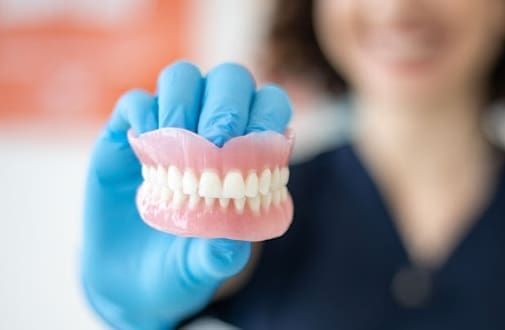7 Signs Your Dentures Need to Be Repaired or Replaced
If you’re like most people, you probably don’t give much thought to your dentures – until they break, that is. Whether you’ve lost a tooth or two, or all of your teeth, dealing with a broken denture can be a real pain.
If you’re wondering whether you should repair or replace your dentures, you’re not alone. It’s a common question, and there is no one-size-fits-all answer. The best course of action depends on a number of factors, and we will discuss them in this article.
-
The Age Of Your Dentures
How old are your dentures? If your dentures are relatively new, it may make more sense to repair them rather than replace them. However, if your dentures are quite old, it may be time for an upgrade.
-
The Severity Of The Damage
What kind of damage do your dentures have? If your dentures are cracked, chipped, or otherwise damaged, you may be able to have them repaired. However, if the damage is severe, it may be best to replace them.
-
The Fit Of Your Dentures
How well do your dentures fit? If your dentures no longer fit well, it may be time for a replacement. Ill-fitting dentures can cause a number of problems, including pain, soreness, and difficulty eating.
-
The Appearance Of Your Dentures
Are you happy with the way your dentures look? If you’re unhappy with the way your dentures look, you may want to consider replacing them. With new dentures, you’ll be able to choose the size, shape, and color of your teeth so that you can get the perfect smile.
-
The Discolouration of Your Dentures
The discoloration is usually just a cosmetic issue, but it can also be a sign of damage to your dentures. This can occur for a number of reasons, including staining from food and drink, smoking, and the natural aging process.
If your dentures are stained, you may be able to remove the stains with denture cleaners or toothpaste. However, if the discoloration is due to damage, it may not be possible to repair the damage, and you may need to get new dentures.
-
The Pain Caused By Your Dentures
If your dentures are causing you pain, you should first talk to your dentist. They will be able to assess your situation and determine the best course of action. In some cases, simply adjusting the fit of your dentures can make a world of difference.
If your dentures are beyond adjustment, you may need to get new ones. This can be a big decision, but it’s worth considering if your dentures are causing you pain. Your dentist will be able to help you choose the right type of dentures for your needs and make sure they fit properly.
-
The Cost
How much does it cost to repair or replace your dentures? Of course, the cost is always a consideration. Dentures are not cheap. In general, repairing dentures is less expensive than replacing them. However, if your dentures are severely damaged or if you’re unhappy with the way they look, replacing them may be the best option.
Conclusion
If your dentures are causing you discomfort or you notice any of the signs mentioned in this article, it’s essential to visit your dentist. They will be able to assess the situation and advise you on the best course of action. Whether you need to have your dentures repaired or replaced, it’s important to act quickly to avoid further damage and discomfort.
Weymouth Dental Arts is home to some of the best dentures dentists in the country. Whether you’re looking for general dental care, cosmetic dentistry, dental implant-retained dentures or anything in between, we’ve got you covered!
We welcome patients of all ages, so whether you’re young or old, we can help you get the dental care you need. Book your appointment today, and let us help you achieve optimum oral health!








